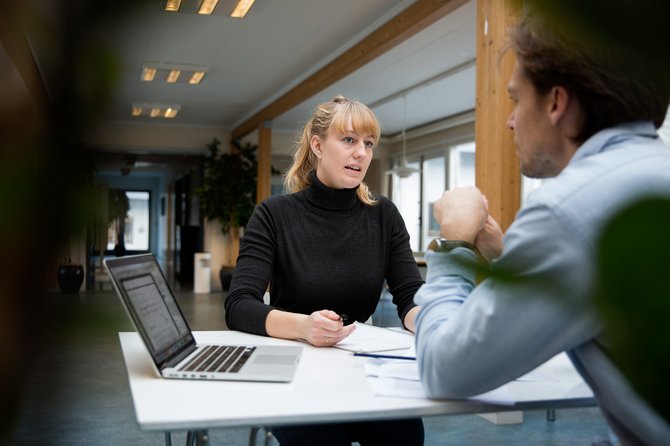After a gap year at a riding centre, Marie Tvilum was ready to start her studies. She was going to be engineer, and she was in no doubt when she chose Aarhus University: "city life is an integral part of your studies," she says.

The mystery was probably what was most alluring. Mixing things together so that something happened that perhaps you didn’t understand at first, but which sparked your curiosity. Chemical reactions between the infinitely small molecules, which you’ll never be able to see, but which could change the physical world.
Marie remembers back at school, when she was amazed to see crystals grow after she mixed liquids in physics/chemistry lessons. It was just so cool, she thought. Cool, exciting and natural: maths and chemistry had always been easy for her: “It just clicked”.
It clicked so much that Marie became a compete nerd at upper secondary school, and took maths, chemistry and physics at high level.
She knew that she was going to take a long-cycle post-secondary degree. And she was sure that she would never study the same as her sister.
Marie Tvilum comes from the tiny village of Eg on the Tved peninsula on Mols in Denmark. A handful of farms are packed together in a small community totalling just under 100 people. This is where Marie grew up: a stone's throw from Begtrup Vig and a short run from the National Park.
Today she live in a small apartment in Trøjborg in the centre of Aarhus and she’s in the third semester of her five-year study programme for an MSc in Engineering in biotechnology at the university, located a few hundred meters from her home.
(The article continues below the picture)
The university In Aarhus is inextricably linked with the city. The city grew up around the university, which is the classroom and workplace for the equivalent of about 15 per cent of the total population of Aarhus. This has held true ever since the university was founded 90 years ago. And actually this was a major factor in Marie's choice of education:
"I'm crazy about the central location of the university. You get city life as an integral part of your programme, and I think that having an affiliation like this with the city makes it is easier to get through the programme."
So after a year off, mostly spent working at a riding centre, Marie decided to go to Aarhus to study, even though several of her friends were looking at other university cities.
"You need to broaden your horizons and meet new people, and luckily it was very easy to get to know a lot of new people in Aarhus."
With maths/physics/chemistry at high level, there was no doubt that Marie was going to read a natural science subject. Her sister studied medical chemistry, and although this was certainly attractive, Marie fell for the idea of studying engineering. The mindset.
"They let you immerse yourself in the detail, but you also have to move on and you can always see the big picture," she says, and after a round of U-Days, she chose biotechnology, even though she only had biology at C level and had always thought "biology was one of the most boring subjects".
So in late summer 2017 she started on the five-year programme for an MSc in Engineering in biotechnology.
(Article continues below the image)
It was important for her to choose a subject with perspectives, and a subject she could feel at home with.
This is because Marie has big plans for what she wants to do with her degree.
"I want to feel that my work makes a difference for people or the environment and nature. I want to develop something big that can really change something. Maybe enzymes or cells that can produce a substance that can cure cancer or something. Find something completely new. A treasure hunt for something that can really make a difference for a lot of people. That’s what I’m looking for. And there are fantastic opportunities here," she says.
She also points to the motivational factor of having researchers as supervisors and lecturers who are working on their own international research projects.
“I think that’s absolutely fantastic. They’re working on fascinating projects. For example, we have a teacher who’s looking for new antibiotics using machine learning. And another one’s developing a method that could completely change the production of chemical substances throughout the world. There are huge potentials, and that makes the course and teaching incredibly exciting. It's just really motivating being a part of it all," she says.
For Marie, it’s all about becoming a specialist. A problem-solver. She loves to study and she likes the theory. Even though the programme is a gateway to global career opportunities, she doesn’t know yet whether she’ll travel out into the world when she's finished. But after three semesters, she is at least sure that engineering is her niche in life.
"Right now, we’re learning an awful lot, and I feel that what we’re learning will help us make a difference. In this context, engineering science is just fantastic, because no matter what subject you study, you can see directly what you’ll ultimately be using it all for. It’s all so tangible, but also very theoretical. It's just a really good balance, I think."
Find out more about the degree programme: